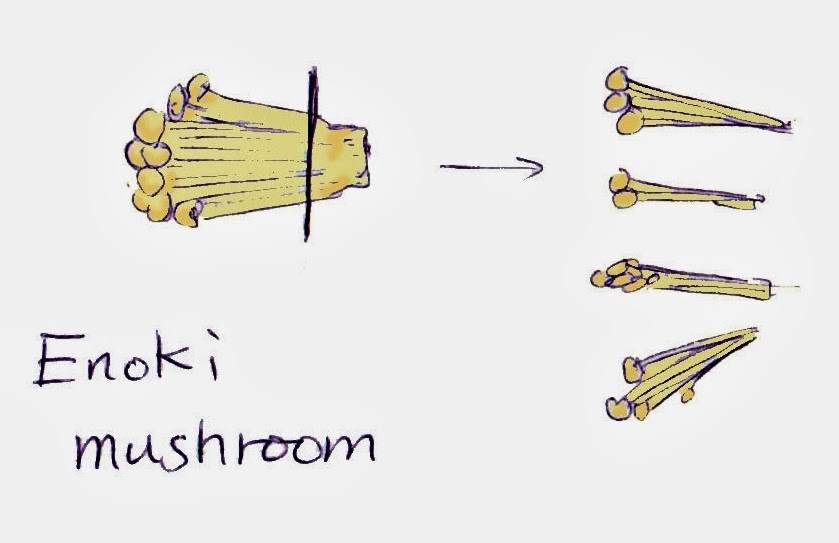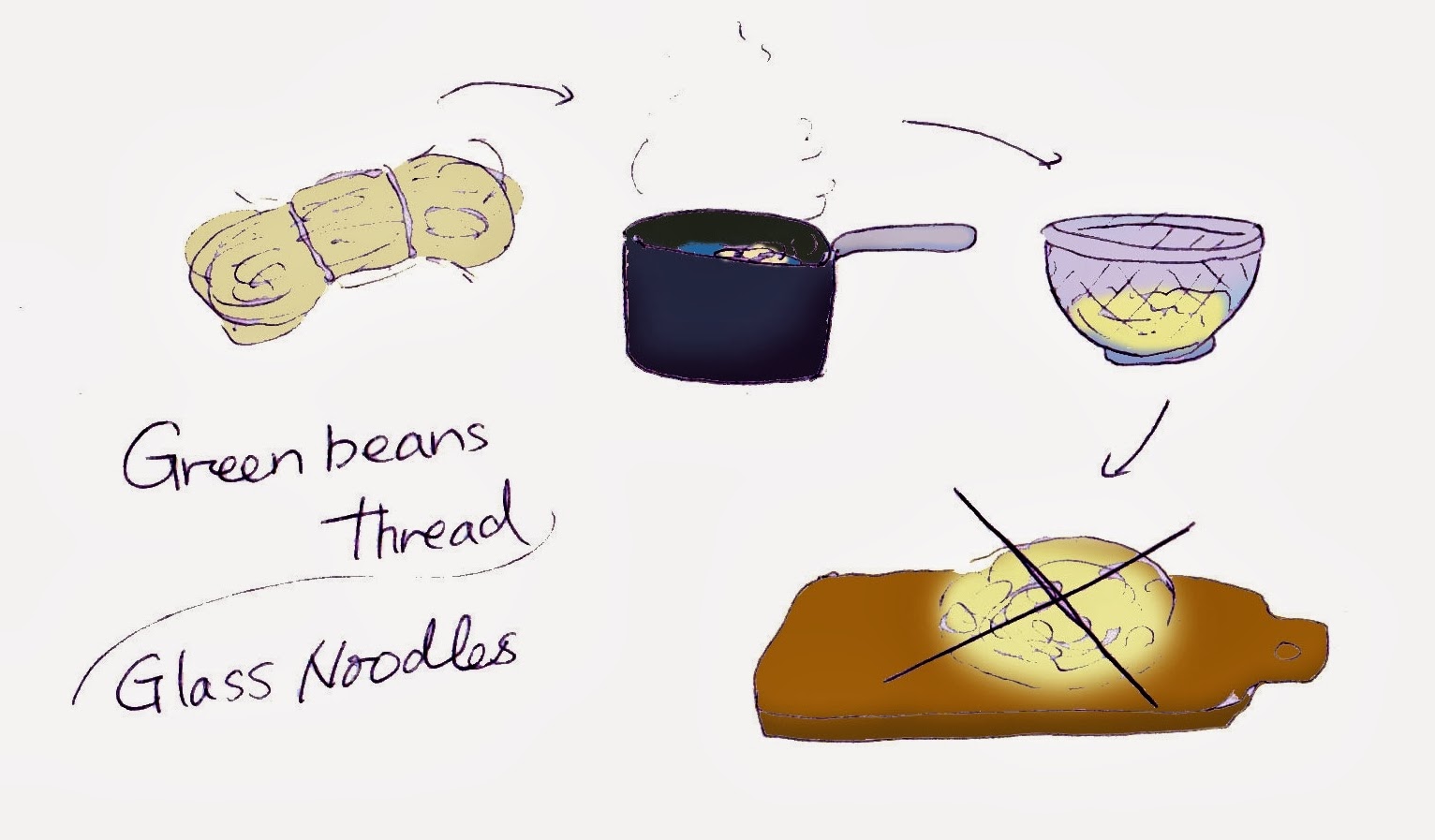Nabe, commonly translated as a hot-pot, literal means just a pot.
In general it also refers to a pot full of boiled ingredients, the soup could be seasoned, could be just a simple Kombu Dashi (stock) and eat with dipping sauce when it is served. Although there is no rule for what to be in, there are few common ingredients and well known combinations/variations. Very simple to cook (although my explanation is long), you can appreciate the best of each ingredients natural taste, one of the best food during the cold winter.
This time I made pork meatballs as the main and served with 2 different kind of sauces - Ponzu soy sauce and Goma (sesame) sauce.
Ingredients:
(Serving 4 in a large pot)<Meatballs>
500g minced pork
2 slices ginger minced
5cm leak white part minced1 Tbsp soy sauce
1 tsp sake
salt & black pepper
1 tsp sesame oil
<Other hot-pot ingredients>
100g Daikon (mooli)
1 Chinese leaf lettuce (based on British supermarket size, about 10cm diameter ones. Asian market usually carries more larger ones)
1 pack of Enoki mushrooms
2 leaks - choose thicker & whiter ones
1 pack of bean sprouts
100g of glass noodles (you can buy and boil 250g pack and use half of it for salad)
1 pack of Tofu
1 Tbsp of sake
1 Tbsp of soy sauce
<Ponzu soy sauce>
1/2 cup of soy sauce
1 lemon juice
1 Tbsp of Mirin (alternatively, put 2 tsp sugar and 2 Tbsp sake in a small bowl, cook it in micro-web for about 5 seconds, until the alcohol are mostly gone out. mix it to make sure the sugar is melted, leave it to cool down)
* Adjust the lemon juice proportion to fits your taste.
* Adjust the lemon juice proportion to fits your taste.
<Goma (Sesami) sauce>
6 Tbsp Neri-goma (Japanese sesame paste)
or
4 Tbsp tahini + 2 Tbsp water, avoid sesame oil on the top and try to get only the sesame paste part as much as you can
or
4 Tbsp tahini + 2 Tbsp water, avoid sesame oil on the top and try to get only the sesame paste part as much as you can
2 Tbsp soy sauce
2 Tbsp sugar
2 Tbsp white sesame, grind in a food processor for 1/2 min
1/3 cup cold water
a pinch of salt
1/3 cup cold water
a pinch of salt
* Adjust the white vinegar proportion to fits your taste.
<Garnish>
few bunches of spring onions sliced
Optional: some Daikon ground and drained
Optional: 1/2 cup per person of steamed rice (for ending)
Do-nabe (Japanese ceramic pot) is the best always, but be honest I also use a large but not too deep iron pot.
If you have a Do-nabe to use, make sure to dry the bottom of the pot when you cook - drops of liquid is the most easy way to crack the pot.
A slotted spoon and a large soup spoon are essential for serving.
Method:
1. Prepare your pot. Make sure your pot is large enough to share the meal. I use one of about 40cm diameter pot.
<if you use Kombu>
Pour in water to a large pot until about half line and put the piece of Kombu in. Set it aside until the meatballs are ready.
<if you use chicken stock>
Just place a half pot of chicken stock.
2. Prepare your meatballs. Pour cold water in another medium size pot and start to boil.
4. The mass should be start to get stickier by the melting meat fat naturally. If the minced pork has too less fat and cannot make them together, add small amount of potato starch or all purpose flour (up to about 1 Tbsp). Nice to leave this mixture in your refrigerator for over 1 hour, usually not possible for me with my 2 hungry boys behind me.
5. As soon as the water in the medium size pot gets boiled up, reduce the heat to medium low and start making about 2-3 cm diameter balls. Just scoop it by a tablespoon and make a ball between your hands. Put it into the boiling water from the one you made.
6. Once all meatballs are in the pot, then bring the heat up and boil them for 5 minutes, skim out visible scums through the time.
7. Using a slotted spoon, take all meatballs out to a plate (don't drain out the soup) and stop the hob - don't worry that they are not fully cooked here because you will boil them again in a pot.
8. Place a sheet of kitchen paper on a strainer, then place that on the main large pot. Strain the meatball broth carefully into the main large pot until about 80 % full.
9. Put the meatballs, sake and soy sauce in the main large pot.
10. Cut Daikon in about 2 cm thick, skin it then cut them in 4 quarters. Place them in the main large pot, place the cap and cook them for about 10 minutes until it gets soft. Stop the hob and leave the pot aside.
11. Prepare all other ingredients. Cut Tofu in half width then slice it in about 3 cm pieces.
12. Cut the Chinese leaf lettuce in about 3-4 cm size, the large leaf parts as below, smaller ones are into half.
13. Cut the Enoki mushroom, enough above the tighten bottom of a pack, like the picture below, then wash well under running water with separating them into small bunches - especially carefully check and clean the bottom part, they may contain some small piece of soil still in.
14. Trim out the bottom and top green part of the leaks and cut it into about 2 cm slices as below picture.
15. Place the bean sprouts in a strainer, wash them under running water then trim the thin roots and the remained seed shells - be honest, this is boring optional work. When I really don't have patient time I omit this work. Painful task but it makes difference when you eat.
16. Boil the glass noodles with the tied strings in another sauce pan. When the noodles start to get soft, scoop the tied string with a fork (or chopstick if you can use) and take it out from the pan. (The string is difficult to take off when the noodles are dry but much easier after boiling them in a pot.) Waggle them by the fork and make them loose, keep boiling for few minutes until all part of noodles are transparent and soft.
Drain them on a strainer, run over cold water until it gets cool, then place them on a cutting board and cut it in to 4 quarters.
17. Prepare the serving sauce and garnish. Mix all listed ingredients for each sauce in each serving sauce bowl. Slice the spring onion, optionally grind the small piece of skinned Daikon, drained the liquid then put them on each small serving plate.
18. Place all kind of ingredients you prepared into the pot, except the Daikon & meatballs you already cooked in, following the next order: the white part of Chinese leaf lettuce, leaks, Enoki mushrooms, Tofu, glass noodles, and at last, the green leaf part of Chinese leaf lettuce on the top of all (basically the thing that harder and takes longer to cook goes to the bottom and soft/easy to cook things are at the top).
* Don't need to cook all in once, adjust the amounts to put into the pot as your family can eat in once (especially if you don't have a table hob), keep at least few cm without soup at the top of the pot, for not to blow it up.
If you have too much soup then place some out in another bowl or pot. you can add them for the 2nd round.
19. Place the cap on the pot.
Now the real cooking part.
The whole point of hot-pot is to be served from the hot pot to your dish to your mouth while they are on heat. If you have a table hob, this is the time to use it. If you don't, don't worry, you just need to cook them in smaller amount and boil it several times as it goes.
20. Firstly, start cooking it on your regular hob.
If you are using Do-nabe, use medium high heat, keep eye on it and wait until the top of the cap center gets heated. Depends on the size of pot but mine takes about 15 minutes.
Once it is boiled, then move the pot carefully on to the table hob and keep heating the pot with a low heat.
If you are using a regular large pot, then just boil them using high heat until start to steam out, check the white bit of Chinese leaf lettuce are softened then bring it to table.
How to serve/eat:
Take off the cap. The pot should looks like the top picture.
Each individuals are served with a small bowls to take your portion. Serve few each but every kind of ingredients from the pot to each bowl, then each person can pour the preferred type of sauce on it. Optionally add some ground Daikon and/or sliced spring onions. Adjust the sauce strength by adding some soup. If you like soupy way then add up more soup from the pot.
Alternatively, let everyone serve their own bowl by themselves.
In my home, I serve only the first round to everyone, then from the next round, everyone serve their own bowl with what ever they like.
Keep repeating the pot until everyone satisfy the meal. Adjust the soup level by adding some water if it gets too low.
Optional: Ending
Once everyone satisfy with the meal, then the pot should be kind of empty with the soup only remained. To end the meal, we usually put some rice in the remaining soup and enjoy the Ojiya (rice soup). Put the required amount of steamed rice (can be just cooked or cold left over) for about 5 minutes, until rice get soft and soup start to be slightly sloppy, then season it by a bit of salt, miso or soy sauce.
Alternatively, cooking Udon noodle in the soup is very nice way too. again salt, miso or soy sauce to season it. Also if you have too much ingredients still remain in the soup, that makes excellent miso soup for the next day; just heat it up again the pot, then stop the heat once boiled up and mix in some miso to fit your taste.
All this is possible because the nabe has already made the good stock out from all ingredients.
By the way, the Kombu, if you use, should be left in the pot until the end of meal. Not many people like it but I love to nibble it at the end...








No comments:
Post a Comment